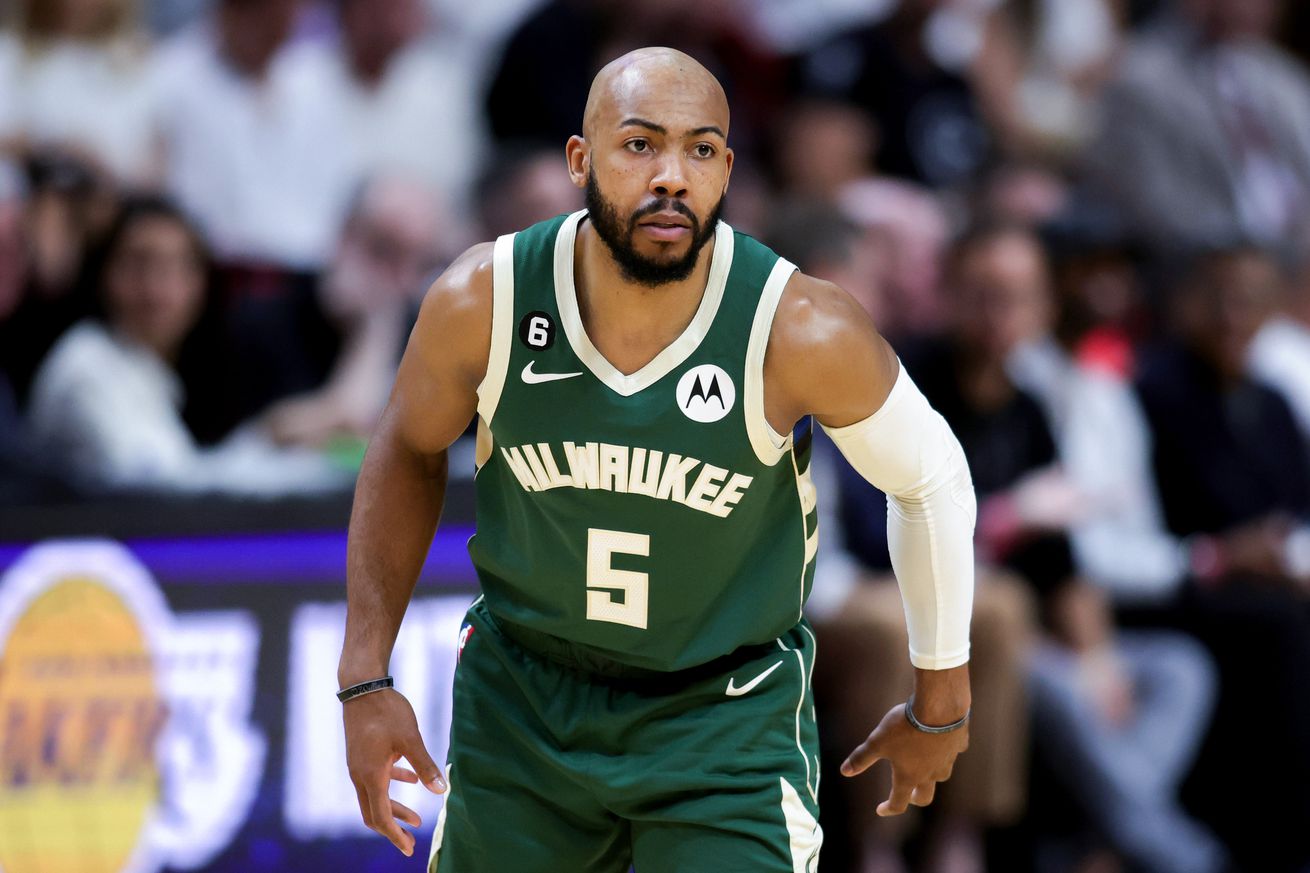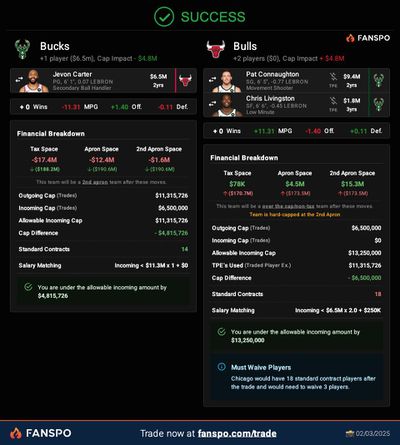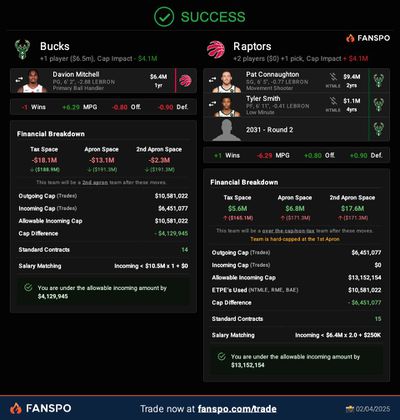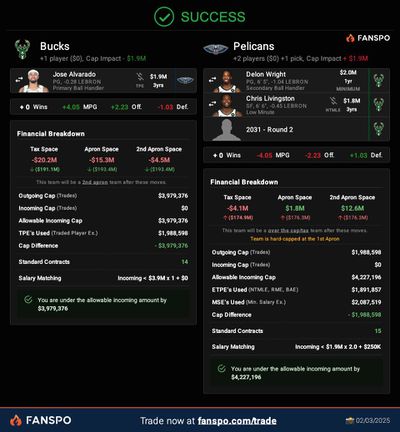
Three guards who could really help Milwaukee’s backcourt defense, including an old friend
With the trade deadline just over 48 hours away, today we have a three-for-one profile of guards who would fill similar roles for the Bucks. We’ve gone through several big men and a wing thus far, so now it’s time to head to the backcourt and focus heavily on defense. We’re talking about three established point-of-attack defenders, one of whom you’ll remember: the Chicago Bulls’ Jevon Carter, the Toronto Raptors’ Davion Mitchell, and the New Orleans Pelicans’ Jose Alvarado.
The Players
Jevon Carter, 6’1”, 200 lb. combo guard
Season averages: 3.5 PPG, 0.9 RPG, 0.7 APG, 0.3 SPG, 0.0 BPG, .422/.391/.750
If you’ve been a Bucks fan since 2022, you know Carter well. During a year and change with the franchise, he was loved by fans for his 94-foot defense on opposing ballhandlers that earned him the Bulldog nickname, though maligned for his proclivity for pull-up threes in transition. Still, his 81-game (with 39 starts) career year in 2022–23 earned him a two-plus-one deal with Chicago after leaving Milwaukee in 2023. The oldest of the trio at 29, he has a $6.8m player option for 2025–26 that he’ll undoubtedly exercise.
But it hasn’t gone as well for Carter since. His is certainly a deal the Bulls would like to get off of, especially with Tre Jones joining an already overstuffed corps of Bulls point guards after Sunday’s Zach LaVine/De’Aaron Fox trade. Now even more superfluous, Carter is averaging just 6.5 MPG in 22 games, racking up 26 DNP-CDs. He appeared in 72 games last year, looking very little like he did in hunter green and cream. It’s fair to wonder if his Buck tenure was a flash in the pan, and/or he’s just no longer good.
Davion Mitchell, 6’2”, 205 lb. combo guard
Season averages: 6.3 PPG, 2.0 RPG, 4.6 APG, 0.7 SPG, 0.2 BPG, .427/.357/.667
Mitchell is 26, and while he never developed into a talent commensurate with his selection at ninth overall in the 2021 draft, he’s carved out a decent career between Sacramento and Toronto. The former Naismith Defensive Player of the Year, he’s always been known as a defense-first player, even as the third-leading scorer on Baylor’s 2021 NCAA championship squad. While hasn’t found any accolades yet in the Association outside of the 2021 Summer League MVP (that’s gotta count for something), his reputation as an on- and off-ball defender is very strong, and he’s certainly not lacking in confidence or pride.
While he’s not as much of a defensive playmaker that generates steals, he’s well-accustomed to guarding an opponent’s best backcourt player. Lineups often perform 3–4 points per 100 possessions in defensive rating when he’s on the floor, and he’s nearly always available: he’s missed no more than 10 contests in any of his three seasons. The main knock on him has always been substandard offense, but his assist numbers are strong for a backup who is off-ball sometimes, and his three-point shooting has been around league average the past two years. This year, he’s started 22 games for the Raptors while Immanuel Quickley has been hurt. He’s in the final year of his rookie-scale contract and is eligible for restricted free agency this offseason.
Jose Alvarado, 6’0”, 180 lb. point guard
Season averages: 9.7 PPG, 2.0 RPG, 4.1 APG, 1.3 SPG, 0.3 BPG, .404/.413/.794
“Grand Theft Alvarado” is an S-tier nickname and pretty apt for the undrafted Nuyorican (a New Yorker of Puerto Rican descent) guard, who is well-known for his ball-hawking throughout the league: he averages three steals per 36 minutes for his career. An on-ball menace, one might liken him to a smaller Jrue Holiday, though his game is more speed-oriented than strength. But he’s developed offensively throughout his four seasons in The Big Easy too, averaging a career-high in assists and 3P% (which has improved every season) in 2024–25.
Also 26, Alvarado has missed 23 games this year due to a left hamstring strain but returned a month ago, and he’s been quite effective when during his 22.2 MPG. He only suited up for 56 and 61 games over the past two seasons due to other leg injuries. Though he’s making below the three-year veteran’s minimum in his fourth year, the minimum deal he was converted to from a two-way contract in 2022 ends this offseason, and he’s already inked to a two-year, $9m extension beginning next season.
The Trades



As you’ll note, all three deals have similar constructions. Connaughton is needed to acquire the salary of either Carter or Mitchell, but he’s going to need some compensation headed out of town with him. In Carter’s case, the only difference is that he makes about $2.6m less next season. Combined with his age, that’s ever so slightly less undesirable than Connaughton’s deal, but not enough to merit the 2031 second-round pick, in my eyes. Chicago can take lottery ticket Chris Livingston in addition, but anything more than him, MarJon Beauchamp, or Tyler Smith and I’d walk away. As it stands now, they’d have to waive someone to accommodate him; little-used wing Talen Horton-Tucker is the most likely candidate left.
For Mitchell, though he will hit restricted free agency this offseason, Toronto (and Milwaukee, should they acquire him) can retain him by extending a qualifying offer and/or using his Bird rights. Mitchell is probably the best overall player of the three and is certainly the healthiest, which is why he’ll probably cost the most. Since he’s a regular rotation guy who they can keep around, likely for pretty cheap—I highly doubt any team will sign him to an offer sheet this offseason—they probably want to keep him. It’s definitely going to take the 2031 second to pry him away, and though I’d offer Livingston or Beauchamp first, they’d probably prefer any of the Bucks’ other young talent. I wouldn’t hesitate to give them Livingston or Beauchamp alongside Smith, and I might also say yes if they wanted Andre Jackson Jr. (after all, Mitchell would be taking many of his minutes) instead two of the three deep reserves. I’d draw the line at AJ Green and probably AJ Johnson too.
Similarly, New Orleans will need more than salary-matching and the 2031 second for Alvarado, but Connaughton is too expensive for them to take on without sending out an extra $3.6m in salary, so we’ll use Delon Wright’s expiring minimum. Alvarado’s upcoming extension could be an important leverage point here for Milwaukee, given his health issues. Another thing to consider here is that the Pelicans are currently above the luxury tax line and probably want to dip beneath it, given their record. This trade would add salary, and the Bucks can’t take back more than they send out since they’re way above the first apron, so no help there. The Pelicans’ best bet to cut salary, and perhaps their likeliest move this week, would be to trade Brandon Ingram. Again, I’d start with Livingston, but if they want to combine or replace him with Smith and/or Beauchamp, no problem. I’d also probably give them AJax if they don’t want one or both of Livingston or Smith, but I might balk at including the 2031 second in that case. Green and Johnson are right out.
The Fits
Obviously, each of these guys would be counted on for the same thing if they came to Milwaukee. AJax is the Bucks’ best perimeter defender and may still be over all three of them, though he has struggled with smaller, faster guards at times this season (notably against Jalen Brunson a few weeks back). And there are the fouls, of course. While he’s definitely capable, another guy to spell Jackson or potentially play alongside him will do wonders for this team, but more importantly, add more defense next to Damian Lillard.
Mitchell and Alvarado are among the league’s best at the point of attack and could be game-changers in both regular and postseason matchups for Milwaukee. The Bucks don’t generate many turnovers at all, and given how they come up well short of their opponents in terms of raw field goal attempts at times this season, extra possessions would be welcome. Alvarado is definitely more of a playmaker, but what the Bucks need most is someone to simply slow down scoring guards, if not thwart them outright. That will significantly reduce the pressure on an interior defense that’s been pretty beleaguered lately. Carter is theoretically capable of all this as well.
In terms of point guard abilities, Alvarado might have a tiny edge over the more turnover-prone Mitchell (at least this year) as a ballhandler, but the latter is probably the best passer. Either would make for solid floor generals in minutes where Dame and/or Khris Middleton are off the ball or off the court. They’re primarily spot-up guys who don’t create their own looks, but they create well enough for others.
Carter has the stronger shooting numbers over the course of his career, and as we saw from the 33 games he started next to Holiday in 22–23, he does pretty well off-ball. But we also saw that he isn’t a great option as a backup point guard, so he might be best served playing alongside other facilitators like Dame, Middleton, and Ryan Rollins. That could make for a small backcourt, but that might be necessary against teams like Cleveland.
Moreover, we know what Carter used to be, and while I question if he’s still that capable on either end, perhaps returning to where he found his most success will rekindle the edge we knew him for. He’s a low-risk acquisition, given that he’d be the easiest to acquire, and the reward might be higher than it seems, thanks to pre-existing chemistry with a few current Bucks. Milwaukee saved Carter’s career once before after the Nets cut him in 2022; perhaps they can do it again?
Which of these three names do you like the most? Do you think Carter still has enough to provide a winning ballclub defensively? If they nabbed Mitchell, what kind of extension would you entertain this offseason? Are there any other names you’d prefer for backcourt help, or are you content rolling with AJax into the playoffs? Let us know in the comments.